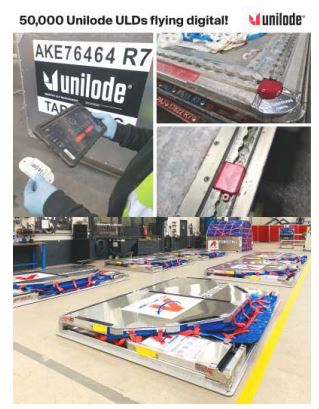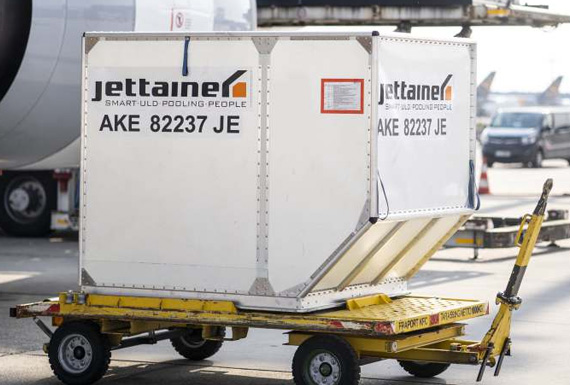ULDs: An indispensable part of air cargo and logistics to safely transport cargo
“ULDs are important, a mission-critical part of smart, efficient air logistics that allowed the vaccines to save lives and protect communities. The entire air transport community rose up as a global group and accomplished exemplary, unprecedented airlift very quickly. We are proud to be playing a part in the effort.” Steve Townes – ACL Airshop, CEO
Frontline industries air cargo and logistics rose to the challenges of the Coronavirus pandemic in transporting countless tons of medical supplies like masks, PPE, oxygen, ventilators, medical equipment, medicines and other pharmaceuticals, apart from other basic essentials like food.
Faced with so many aviation and border restrictions during the first few months of the pandemic, air cargo carriers have to quickly adapt to new health and safety protocols, interim systems of operations and enhanced routes to reach destinations at shortest distance.
And behind their successful missions are the so-called Unit Load Devices (ULDs), both used in passenger and cargo planes, to move packages, luggage and other types of cargo, in a single unit that can be moved on and off an aircraft quickly and safely.
ULDs come in different types and forms—containers, straps, nets, pallets, etc., tailor-made to suit what is being transported like time and temperature-sensitive products such as pharmaceuticals and in today’s pandemic, the billions of doses of COVID-19 vaccines.
 Mission-critical to air logistics
Mission-critical to air logistics
With airlines forced to ground their planes due to the global travel ban, the air cargo industry had to improvise to fill the gap with the loss of belly-hold capacity on passenger flights. The solution: Turn passenger aircraft into freighters giving birth to the so-called “preighters.”
Both freighters and preighters need ULDs to safely transport cargo via air, flying thousands of miles across continents to deliver vital medical cargoes.
ACL Airshop, one of the world’s biggest tech-powered ULD companies doing business with over 200 international airlines and the top 100 air cargo airport hubs, said there’s been a great demand for the company’s services during this pandemic to support the complex, diverse and fragmented global supply-chain.
“The global supply chain is a complex and fragmented ecosystem with many branches, subsets, players, and stakeholders. The COVID-19 crisis has highlighted the strategic criticality and strengths of the air cargo supply chain, while also exposing some of the risks and weaknesses. We agree with IATA: COVID-19 has forced increased cooperation and SPEED across all parts of the airborne supply chain to ensure the timely delivery and broad distribution of vaccines in a safe, fast, controlled manner,” Steve Townes, CEO of ACL Airshop, told Air Cargo Update in an email interview.
Townes, a US Army Ranger graduate of West Point and Harvard Business School, noted, “ULDs are important, a mission-critical part of smart, efficient air logistics that allowed the vaccines to save lives and protect communities. The entire air transport community rose up as a global group and accomplished exemplary, unprecedented airlift very quickly. We are proud to be playing a part in the effort.”
ACL Airshop, which is into leasing and repairing ULDs, apart from selling ULDs and other cargo products, had since expanded its ULD fleet to meet growing customer demand worldwide.
“As COVID-19 caused massive grounding of belly load lift capacity in the worldwide passenger fleets—where a substantial percentage of daily air cargo normally flies—the freighter operators swooped in quickly to pick up the slack. That was complemented by “Preighters,” showing the creativity and speed of execution in our industry. Our company pivoted quickly with these tectonic shifts in client activity and new demand trends,” said Townes.
“We have invested aggressively in expanding our own ULD fleet for our customers’ use, and adding to our technology investments to keep pace. Altogether, this has been a most unusual and challenging period, but our people around the world rose to the occasion and kept the business growing—safely. The high-performance culture of ACL Airshop really showed brilliantly during the pandemic and now beyond,” he added.
Uniquely made ULDs
Early this year, Jettainer, a global leader in ULD management, unveiled plug&fly, a new basic version of its full-service ULD solution tailored for small and mid-sized airlines.
Jettainer says it uses an integrated IT solution harnessing artificial intelligence, ensuring real time visibility of ULDs and inventories, thus, enabling their small and mid-sized airline customers to save apart from maximizing space on aircraft.
“Big carriers are not the only ones who get to enjoy optimized ULD fleets and the smart global management services provided by Jettainer’s industry experts. Many other airlines with fleets of up to 2,000 ULDs can now reap the rewards too. To arrive at this destination, we had to take a separate, more streamlined approach that we are now rolling out with plug&fly,” said Thomas Sonntag, Jettainer’s Managing Director.
Continuing with innovation, Jettainer also announced it’s creating the digital image of each of the 100 ULDs it owns. The move is designed to help the company acquire comprehensive lifecycle data as well as optimize the use of ULDs economically and environmentally.
Each digital twin processes data from three main sources: JettWare, Jettainer’s steering and tracking system, asset database and its repair flow management. The smart solution clusters all ULD-specific information, starting with the unique identifier, the exact type and specifications, the manufacturer, the date of manufacturing and purchasing.
It processes all past steering and repair events, repair specifics and processes real-time information on condition, status and location. With every gradual development step of its digital twin fleet, Jettainer improves analysis of data and automated work flows.
ULD digitalization
Digitalization in the air cargo industry continues to impact the supply-chain. ULDs, has for instance, been using Bluetooth to keep track of containers and pallets.
The Zurich-based Unilode Aviation Solutions, which manages the world’s largest outsourced fleet of ULDs and owns the largest global network for the maintenance and repair of containers, pallets and inflight food service equipment, announced in June that it has equipped 62,080 ULDs with Bluetooth tags.
“So far, more than 60 airlines have provided Unilode with operational allowance to load digitised ULDs onboard their aircraft, and all major ULD manufacturers have been cooperating with Unilode, placing us in the position to digitally enable almost all units beyond our own fleet,” the company said.
ULDs has embraced digitalization and it will continue to evolve over time, particularly in terms of weight and tensile strength amid the world’s quest to reduce fuel consumption and cost, according to ACL Airshop CEO Steve Townes.
“The planes themselves are designed to last for decades, and ULDs are designed to become an integral part with the aircraft when the cargo is loaded. Hence, ULDs will evolve but in the main the designs will stay stable. They’re well proven for the mission, and ULDs are indeed mission-critical: you cannot fly without properly securing the load. What might change is weight and tensile strength, the quest for reducing fuel consumption and cost. There is the constant search for lighter materials,” said Townes.
“Plus, innovative technologies such as ULD logistics management programs, Bluetooth tracking and tracing, tying those technologies to the airway bill itself for all clients for even more-seamless end to end visibility. All of these digitalization changes are now sweeping like a wave across the air cargo sector,” he added.
In 2020, ACL Airshop made history when it launched the world’s first collapsible AAY containers that can carry up to 280kg. Each container can be assembled and collapsed by two people in just two minutes. This unique ULD saves space, time and money.
“Those of us in the ULD and logistics services businesses must invest steadily and smartly to keep up and keep advancing. That is what customers expect. At ACL Airshop, we will keep raising our trajectory on their behalf. With giant new Infrastructure majority owners, we now have even more “fuel in our tank” for strategic scalability and accelerated growth—thus for expanding and improving our customer services even more broadly,” Townes said.










